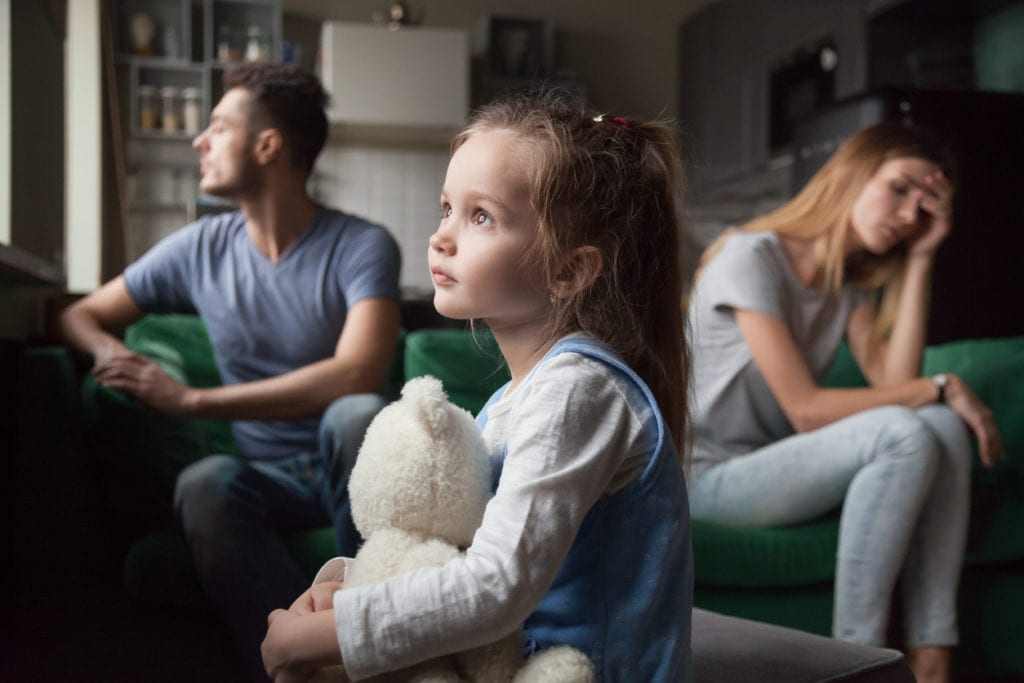There is no prescribed formula for how to tell your children that mom and dad are going to separate. It’s impossible to ensure they fully understand what your divorce means.
However, by following a few tried and tested guidelines when you separate, you can ease the blow and help ensure that your children adjust to the changes over time.

How to tell your kids about the divorce
The first consideration before breaking the news about divorce to your children is their age and maturity.
A two-year-old and a fourteen-year-old will naturally handle the news in different ways, but there is likely to be some shock and the need for some adjustment regardless.
Children in their teenage years with some degree of independence may already understand much of the emotional stress involved in a marriage and not feel so threatened by having to live with one parent. They may also be able to see the bigger picture.
Younger children might feel more vulnerable, and the practical questions of who will look after them and where they will sleep may be more pressing concerns.
These general observations vary greatly with the temperament of the child. There are no hard and fast rules.
How to address the different emotional and practical requirements of your children is something only you as parents can decide. However, it is not something that can be ignored, delayed, or trivialized.
In most divorces, no matter how acrimonious and complex the situation becomes between parents, neither parent wants to see their children suffer.
Ideally, the children will not have to witness emotional outbursts or angry exchanges between their parents.
Both parents should be involved in breaking the news to the children. Find a mutually convenient time, agree to leave emotions, anger, and blame to one side, and use simple language that your children understand.
The key messages are usually the following:
- What happened is between mom and dad and is not your fault
- You will be OK, and you will still see us both
- We will look after you
- Some things will change, but whatever happens, we both love you
- Kids and parents are together for life
Check for understanding regularly as you go through your decision with them. Ask them if they have any questions – older kids may have more than younger ones.
Be wary of giving your children too much information in the effort to help them understand – keep things simple and relatable.
How do you handle emotional reactions?
Some children, no matter how gently you break the news or the positive “spin” you put on the divorce, will be very upset by what you tell them.
Try to handle their reaction with great sensitivity, tell them that it’s fine to be upset but remind them that everything will be fine.
Don’t be surprised if your child does not react emotionally like this. It’s perfectly normal.
The reaction can be delayed. It will likely “hit” them at some point later, and it might come out at school or with friends. Also, watch out for tell-tale signs of being upset like lack of appetite, unprovoked outbursts, sleep disturbances, or bed-wetting.
Talking your divorce through with your children is not a “one-shot” deal. It is an ongoing process. Be prepared to address the issues that come up again and again if necessary. Be ready whenever your children want to talk about it.
Typical questions you could be asked include the following:
- Who will I live with?
- Where will I go to school?
- Will I still get to see my friends?
- Will we have to move home?
- Where will dad live?
- Where will mom live?
- Where will I stay at the weekend and holidays?
You can’t always do the right thing in these situations but answering their questions as honestly as you can generally is advisable.
How can you help your children adjust?
Children, as well as parents, need ample time to cope with the changes involved in a divorce. A period of adjustment is necessary.
You may be surprised at first how adaptable your children are but don’t be surprised if there is a delayed reaction.
Many children harbor the hope that their parents will get back together again, even if both you and your ex know it’s over.
Children may need some help and support through this transition period. To assist, try to encourage honesty and openness as you discuss the issues.
It’s generally considered healthy for children to express their feelings. Remember, there are no “wrong” feelings when it comes to divorce. You may be able to help them vocalize their thoughts and feelings – but don’t forget to listen first and foremost because all their reactions are valid.
Try to get back to doing their favorite things together – that applies whether you have primary physical custody or you see them mainly at weekends.
If you and your ex can manage your own stress and stay healthy and fit, that will help you remain positive in your children’s presence too.
How should you and your ex behave around your children?
There are certain guidelines that you and your ex should follow to “shield” your children from the “fallout” of a divorce.
With emotions running high, it can be a constant challenge to remain calm and civil with each other in front of the children, but it will help you both feel better about the situation if you can. No finger-pointing or blame games. Leave any hostility outside of the family home.
Remember, children brought up in an environment of anger and hostility are much more likely to have emotional and behavioral problems in adult life.
It usually makes sense to keep the nitty-gritty of discussions between you and your ex away from your children, especially if one parent is deemed to be at fault for the divorce.
Consider getting help from a counselor or therapist rather than sharing too many details with the children in the hope of garnering emotional support from them.
It’s also important to be consistent around your children – especially the younger ones. If you chop and change your behavior or routines, they might become more confused at a time when they need more clarity, familiarity, comfort, and certainty.
Schedule enough time for your child to spend with your ex even if you are not on good speaking terms. Again, this familiarity and consistency should help your children adjust.
If you need help with any aspect of a divorce and you are based in the Monterey area, contact Giuliano Law at (831)293-1329 for an initial consultation.


